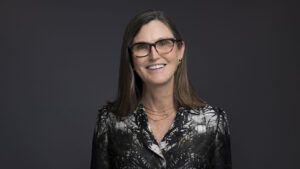There are many different ways to approach sustainable and impact investing, so what happens when a merger or acquisition brings two firms’ approaches together?
US firm Ark Invest recently acquired specialist ETF issuer Rize ETF from AssetCo in a bid to expand into Europe and the UK.
Speaking to ESG Clarity shortly after the announcement, both firms are adamant their approaches to sustainability are only set to benefit from this high-profile deal.
“We’re convinced that our DNA is even more similar than we thought it was before,” says Ark CEO Cathie Wood (pictured).
Wood founded Ark, which manages around $25bn in assets, in 2014 to focus on investing in innovation such as artificial intelligence, robotics, energy storage, DNA sequencing and blockchain.
You won’t have seen Ark branded as an ESG or sustainability firm, although Wood says she “always said Ark strategies are organically and intrinsically ESG or sustainable”. Certainly in its bottom-up analysis the firm uses a six-point proprietary scoring system that integrates ESG risk and its focus on innovative disruptive companies often intersects with those seen as having positive impact.
“But we never put a label on it because we saw so much greenwashing, we knew the SEC was going to go after companies, and this is happening now, and [many know] that ESG sells and put a label on without really having a process in place around sustainability,” she says.
“And in the US there was a political dogfight taking place around ESG, so thank goodness we’re not involved in that drama.”
But in acquiring Rize ETF, a firm with six Article 9 funds, and entering the European market, the emphasis on sustainability may well grow.
“Of course we will expand upon how ESG is incorporated in the scores,” Wood says.
Ark’s funds are expected to be Article 8, Wood says, a term she first heard from Nikko Asset Management, a strategic partner of Ark in Japan in which Ark advises on the Nikko AM ARK Disruptive Innovation Strategy. “I know how important [Article 8 and 9] were to Europe,” she adds.
For Rize ETF, which will become ARK Invest Europe, part of the appeal of the acquisition is in the greater influence of becoming a global firm.
“This is going to enhance our engagement programme with companies,” says Stuart Forbes, co-founder of Rize ETF. “Now we’re no longer just a tiny little boutique that’s David versus Goliath in Europe.”
Rize ETF was founded in 2019 by four ex-LGIM employees and has around $450m assets under management.
Future plans
Together, it seems the sustainability wheels are already in motion, with new Article 9 launches planned, exploration of emerging market investment and a credible framework for the Sustainable Development Goals (SDGs).
“We have more [Article 9 funds] in contemplation and what is really exciting for us is that not only are we going to be launching these products in Europe but we now have a global footprint from which to launch and take forward our sustainable approach to impact,” Forbes says.
Wood says the firm has just hired an artificial intelligence expert, who will be looking at innovation in emerging markets now that the cost of innovation is collapsing.
Finally, Ark has developed an SDG matrix that has started to map disruptive technologies (not individual companies) against the 17 SDGs. The plan now is to transform this into a full, detailed methodology that’s transparent.
“What we need to do is actually create a legitimate framework that will stand up to scrutiny and will actually be able to take into account that geographical footprint of the products and services,” Forbes says.
“Innovation is going to be impactful on the world,” Forbes adds. Wood agrees: “We have a lot of environmental and social problems out there. Innovation solves problems.”
